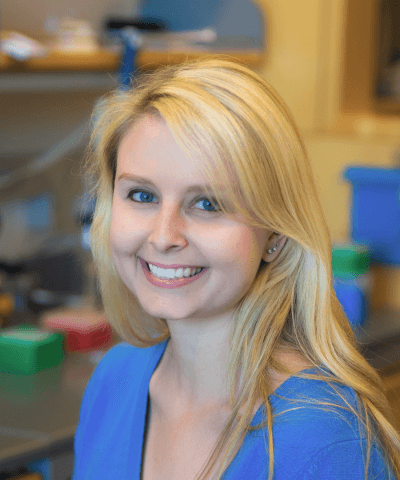
The NIH Director’s New Innovator Award recognizes career excellence among early career scientists working on high-risk, high-reward research with an emphasis on innovation and potential impact. This year’s class of winners includes HSCRB assistant professor, Kara McKinley, PhD whose lab studies how the uterus regenerates after menstruation. Dr. McKinley will receive $1.5 million over five years to continue this work, focused on establishing an animal model of menstruation.
“One of the main goals of the Harvard Stem Cell and Regenerative Biology department is to help humans become better at regenerating parts of our bodies, such as after trauma or other types of wounds,” says McKinley. “Half of the human population already has an incredible regenerative organ — the uterus — which essentially regenerates huge proportions of itself about 400 times during a lifespan. The uterine lining represents an enormous opportunity for learning more about how the human body can heal even after extensive or repeated injury.”
As a scarless wounding event, menstruation is a highly unusual regenerative phenomenon. Even super-regenerators, like axolotls who can regenerate whole limbs, lose this ability after repeated traumatic injuries. “But the lining of the uterus undergoes massive tissue degradation and rebuilding every month for 35-40 years, providing a unique system to understand tissue regeneration at a molecular level,” says McKinley.
Ideally, researchers like McKinley want to study menstruation in animal models. But the list is short. Aside from humans and some other primates, only three groups of animals menstruate, including the spiny mouse. With the NIH Director’s award (grant #1DP2HD111708-01), McKinley will expand her fledging spiny mouse colony allowing study of menstruation in a living animal.
Access to this animal model provides a powerful platform to unravel the cellular and molecular mechanisms of uterine function, down to the single-cell level. The McKinley lab aims to understand how errors in tissue regeneration lead to conditions like cancers and endometriosis, and ultimately to find ways of redirecting systems that scar to instead regenerate the damaged tissue.
“Kara is an outstanding young scientist, and this award will give her the opportunity to investigate a unique regenerative process of the human body that has gone unstudied for too long”, says Paola Arlotta, Golub Family Professor of Stem Cell and Regenerative Biology.
“We are very excited to learn about how the uterus functions normally, and what tips it towards disease,” says McKinley who admits to taking a ‘big swing’ at studying menstruation and menstrual anomalies. “Since most people who have a uterus are going to spend most of their lives menstruating, I’m really enthused that the NIH is providing funding for an area which substantially impacts quality of life and which is historically under-resourced.”
“We are thrilled to see Kara’s truly innovative research program recognized by the prestigious NIH New Innovator program,” says Amy Wagers, Forst Family Professor of Stem Cell and Regenerative Biology. “The insights gained as a result of receiving this award will be transformative for women’s health.”
The NIH Director’s New Innovator Award, established in 2007, supports unusually innovative research from early career investigators who are within 10 years of their final degree or clinical residency and have not yet received an NIH R01 or equivalent grant. Dr. McKinley received her PhD in 2016, ultimately joining HSCRB in January 2021.
